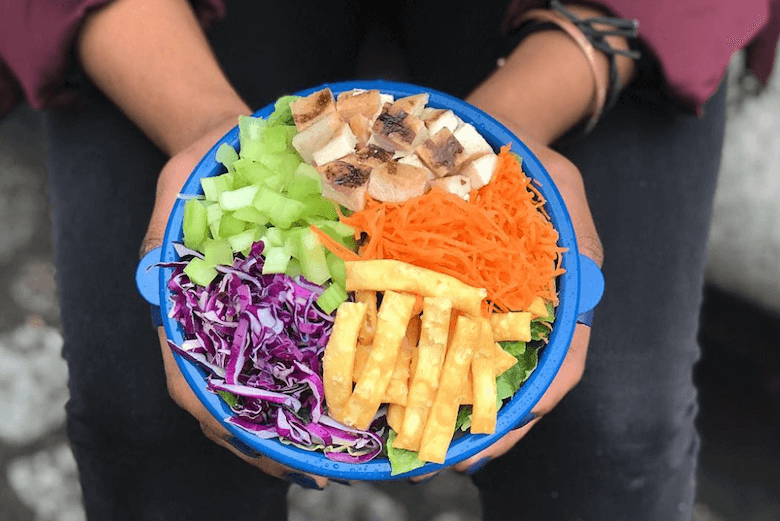https://www.instagram.com/p/BhbvNACh3TW/?taken-by=justsalad
Editor’s note: We’re chronicling how tech is changing the way we eat and drink as we lead up to this fall’s Food Loves Tech. Our annual deep dive into appropriate food and ag technologies returns to Industry City on November 2–3, 2018 and you can get $20 off the regular admission price while our early bird special lasts.
Just Salad’s branded blue reusable bowls really get around New York City. On Instagram, customers and employees post photos of them in the grass in Central Park, in front of the Lincoln Center fountain and in the middle of Times Square. What’s more important, though, is where they don’t go: in the trash.
Which is why last month, the Environmental Protection Agency (EPA) presented the NYC-based company with one of its regional WasteWise awards for 2017.
“Waste reduction has always been a key concern of the EPA. We need to feed people, not landfills,” said the EPA’s acting deputy regional administrator Walter Mugdan, at an awards ceremony for the winners, during which Just Salad CEO Nick Kenner was invited to speak about the reusable bowl program as an innovative eco-initiative.
Kenner said that he was inspired to start the company in 2006 to improve the quality and affordability of fast-casual salads, but that “a big issue was the plastic, particularly with salads versus some other lunch item like a burrito or a sandwich. The plastic that gets wasted on salad is amazing… it’s horrible.”
https://www.instagram.com/p/BihV0I-hQZJ/?taken-by=justsalad
Takeout salads are generally packaged in single-use plastic bowls or clamshell containers, and according to an NRDC report, less than 14 percent of plastic packaging used in the U.S. gets recycled. Plastic that gets thrown out ends up in landfills and pollutes oceans and waterways.
Just Salad’s reusable bowl is still made with plastic, but customers purchase it once (for one dollar) and then wash it themselves before bringing it back over and over. Based on internal tracking data from its now 34 locations, the company estimates the program saves about 75,000 pounds of plastic a year. (As part of the WasteWise program, it was required to provide the EPA with the data.)
And when it comes to hierarchies that rank solutions to environmental issues, reusable materials beat all. “In addition to increasing their waste diversion by 5 percent or more in 2017, most of Just Salad’s waste diversion is source reduction, which is preventing waste before it is even made. Source reduction … is fundamentally different and more desirable than recycling, treatment, and disposal,” explained EPA public affairs specialist Tayler Covington.
“Source reduction” is also the hardest kind of solution to implement, and there are almost no examples of other quick-service restaurants in the country making a program like this work. The same NRDC report looked at the packaging used by 10 restaurants like McDonald’s, Panera and Chipotle. It recommended “reusable serviceware” as the most desirable solution but found none of the companies were implementing it in a meaningful way. The report also found that the vast majority of fast food restaurants that serve salads package them in black plastic, which most recycling facilities can’t process.
Meanwhile, many of Just Salad’s competitors in the fast-casual salad space have switched to compostable containers. These can be less effective than they seem, though, since many people throw them in the trash at home, meaning they end up in landfills anyway. Even when they are separated out, there is currently very little commercial composting infrastructure set up to process them.
So why don’t other companies follow Kenner’s lead? There are of course up-front costs to producing the bowls, and many see a major barrier to getting customers to actually bring the reusable containers back.
While some bowl owners are doing it for the planet, the trick, he said, is free food. “Most of our reusable bowl customers reuse the bowl because they get free avocado or free cheese or two free produce essentials every time they come back. The reusable bowl is a big part of how we deliver on being ‘healthy for everyone.’”



